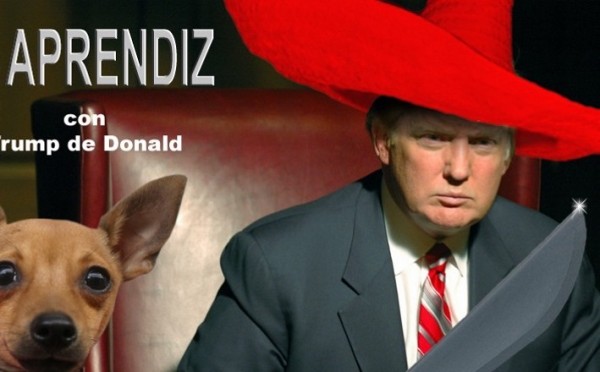On June 16th, 2015, flamboyant billionaire Donald J. Trump announced his run for the U.S. presidency, and the U.S. political world has not been the same since.
In Mexico, the Trump candidacy unleashed a firestorm of criticism.
Within minutes of Trump’s June 16th announcement speech, Mexico’s paper of record El Universal had an article on its website about it.
Trump was soon lambasted by Mexican politicians, ex-politicians, officials, journalists and celebrities.
Yuriria Sierra of Mexico’s Excelsior called Trump ese hitlercillo del siglo XXI (“that Little Hitler of the 21st century”).
Mexican actor Gael Garcia Bernal proclaimed that Trump’s discourse is “hate discourse, and what follows next is genocide or civil war. I mean, that’s how it begins.”
Mexican director Alejandro Gonzalez Inárritu also weighed in against Trump.
Former Mexican President Vicente Fox, visiting Los Angeles, took a shot at Trump. That’s ironic. If any Mexican politician is similar to Trump in background and style, it would be Vicente Fox.
Felipe Calderon, another former president, also got in his two cents’ worth of Trump-bashing.
The Trump candidacy inspired the production and sale of Donald Trump piñatas (just a few days after his announcement), and Donald Trump masks were doing a brisk business in mid-October.
The Mexican video game company Karaokulta developed a game called Trumpéalo, in which the player throws shoes, beer bottles and nopal cacti at Donald Trump.
Mexican writer Enrique Krauze and Cuban-born Carmelo Mesa-Lago (now at the University of Pittsburgh) organized an anti-Trump Manifesto, subtly entitled Declaración de Intelectuales, Científicos y Académicos Hispanos contra Xenofobia de Trump (“Declaration of Intellectuals, Scientists, and Academic Hispanics Against the Xenophobia of Trump”). The document had 67 signers, from Latin America, Spain and the United States.
In December, Mexico’s Ambassador to the United States, Miguel Basañez, announced on U.S. soil a plan to help 3 million Mexicans resident in the U.S. to become U.S. citizens so they can vote. The announced plan was for private sector businesses to loan money to the Mexicans so they can register for naturalization.
Three months earlier, the ambassador had spoken of dual U.S./Mexican citizens voting against Trump, so it seems obvious this registration plan is a way to combat the Trump candidacy.
And thus it goes on and on….
Having resided in Mexico, and being familiar with the Mexican political/media world, I don’t find this reaction very surprising. After all, the Mexican elite believes that the U.S. border with Mexico should be wide open and all Mexicans have a right to enter the U.S. with full benefits. Anything less is considered a grave crime against humanity.
Any proposal to tighten the American border with Mexico is going to be met with hysterical shrieks throughout the Mexican chattering class.
Certainly, Trump has offended many with his blunt way of talking. On the other hand, the American political establishment needs some shaking up.
Trump’s blunt talk has made it easier to talk about formerly taboo subjects, topics that had previously been swept under the rug by the bipartisan consensus and the media.
Such topics include the link between crime and illegal immigration, birthright citizenship, and the relationship between Islamic immigration and terrorism. These are all topics worthy of discussion and Americans have a right to discuss them.
Trump has discussed outsourcing and the national debt. And his foreign policy indicates a willingness to adopt a more conciliatory tone in dealings with Russia.
Despite being a billionaire, Donald Trump has a great ability to connect with ordinary Americans. As a candidate, he’s been successful in winning over many potential voters who didn’t even vote last time around. One poll even indicated that 20% of Democrats would be willing to vote for Trump.
So yes, Donald Trump could actually win the Republican nomination and after that, the presidency next November.
If the American people choose Trump as their president, Mexico is just going to have to get used to it.
And I really doubt that, in the long run, a Trump presidency would be bad for Mexico.
Let’s say a President Trump really did shut down illegal crossings on the U.S.-Mexican border.
That would actually make the border region safer.
And it might even encourage Mexico and other Latin American countries to stop using emigration as an economic strategy and instead to enact better economic reforms.
The Trump border policy, in other words, might be “tough love” for Mexico.
By Allan Wall for TYT
——————————
The opinions expressed herein are those of the author, and do not necessarily represent those of The Yucatan Times.
Allan Wall, an educator, resided in Mexico for many years. His website is located at http://www.allanwall.info.


